|
|
|
Sort Order |
|
|
|
Items / Page
|
|
|
|
|
|
|
| Srl | Item |
| 1 |
ID:
139520
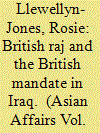

|
|
|
|
|
| Summary/Abstract |
Nearly a century before the 2003 invasion, the western powers, in the form of the British, were required to form a government of Iraq following the occupation of the region in the First World War. This government was led by personnel and doctrines which came not directly from western states, but from the British Raj of India. This article examines the historical links between Iraq and India, how Indian templates of government were imposed on Iraq by the British after the First World War, why these templates of government were ultimately ineffective for Iraq, and the long-term impact on Iraq of the pursuit of these methods of government.
|
|
|
|
|
|
|
|
|
|
|
|
|
|
|
|
| 2 |
ID:
163815
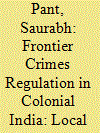

|
|
|
|
|
| Summary/Abstract |
In their pursuit of self-serving goals, sometimes governments create and use various instruments as the means to relatively short-term ends. Such instruments, however, can be tenacious, and have perverse, long-lasting impacts. This paper focuses on one such instrument created during the British Raj: the Frontier Crimes Regulation. Often, the literature on the Regulation focuses on the rationale for its creation from the perspective of the colonisers and refers to the long-term consequences in hindsight, thereby ignoring local voices. However, I show that in 1901, at the time of the drafting of the Regulation, the local colonised population foresaw the potentially lasting pernicious effects stemming from it and voiced their concerns. I demonstrate that these local voices can help us understand the roots of the problems in the Federally Administered Tribal Areas (FATA) of Pakistan today.
|
|
|
|
|
|
|
|
|
|
|
|
|
|
|
|
| 3 |
ID:
048098
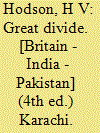

|
|
|
|
|
| Edition |
4th ed.
|
| Publication |
Karachi, Oxford University Press, 1993.
|
| Description |
xii, 590p.: ill.hbk
|
| Standard Number |
0195773403
|
|
|
|
|
|
|
|
|
|
|
|
Copies: C:1/I:0,R:0,Q:0
Circulation
| Accession# | Call# | Current Location | Status | Policy | Location |
| 042575 | 954.03/HOD 042575 | Main | On Shelf | General | |
|
|
|
|
| 4 |
ID:
121236
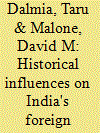

|
|
|
|
|
| Publication |
2012.
|
| Summary/Abstract |
India's international relations after independence in 1947 drew several of
its principal characteristics from earlier Indian history and, in particular,
from India's painful colonial experience under the British Raj.1
One that was
largely dormant until quite recently is India's vocation, throughout most of
its history, as a hub for international trade.
|
|
|
|
|
|
|
|
|
|
|
|
|
|
|
|
| 5 |
ID:
027772
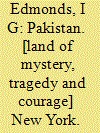

|
|
|
|
|
| Publication |
New York, Holt, Rinehart and Winston Inc., 1975.
|
| Description |
179p.hbk
|
| Standard Number |
003-136962
|
|
|
|
|
|
|
|
|
|
|
|
Copies: C:1/I:0,R:0,Q:0
Circulation
| Accession# | Call# | Current Location | Status | Policy | Location |
| 021654 | 954.91/EDM 021654 | Main | On Shelf | General | |
|
|
|
|
| 6 |
ID:
091386
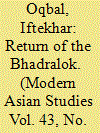

|
|
|
|
|
| Publication |
2009.
|
| Summary/Abstract |
Since the late 1970s, historical studies of colonial Bengal have been dominated by the recurrent theme of the 'return of the peasant', generally set against the previously predominant notion that British-created landlords were omnipotent agents of agrarian relations. Although the new historiography restores agency to the peasant, it seeks to attribute the agrarian decline in the late colonial Eastern Bengal, roughly Bangladesh, to the 'rich peasant'. It is argued that the rich peasant wielded hegemonic authority on their poor fellow co-religionists by forging a 'communal bond', while exploiting them from within. Such development is often considered linked to the separatist idea that offered a 'peasant utopia' in the form of Pakistan against perceived Hindu domination. This article, while not altogether denying the role of the rich peasant, argues that the bhadralok, or the non-cultivating middle-class gentry, were far more powerful as a catalyst in agrarian relations in Eastern Bengal than is conceded in contemporary historical debates. In so arguing, this article re-examines the post-structuralist turn that appeared to replace the classical Marxist paradigm of class by that of culture and consciousness.
|
|
|
|
|
|
|
|
|
|
|
|
|
|
|
|
| 7 |
ID:
121530
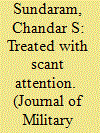

|
|
|
|
|
| Publication |
2013.
|
| Summary/Abstract |
The Imperial Cadet Corps (ICC), was founded in 1901 by the British Raj to give officer training to the princes and gentlemen of India. This article situates the ICC at the intersection of the history of war and society, and colonial Indian history, and contextualizes it within the debate on the Indianization of the Indian Army's officer corps. Though the ICC failed, and closed in 1917, this article argues that it nevertheless established the precedent for the officer training of Indians in India, which reached full fruition when the Indian Military Academy opened in 1932.
|
|
|
|
|
|
|
|
|
|
|
|
|
|
|
|
|
|
|
|
|